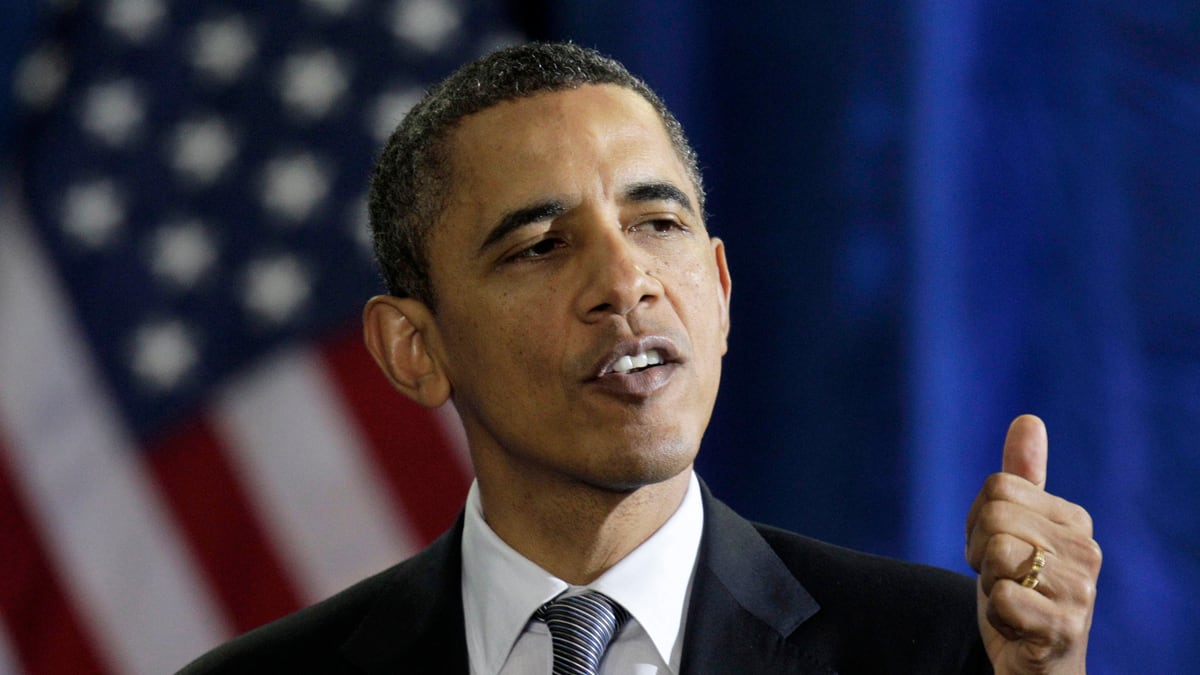Remember the days when a Barack Obama speech was an event? Can’t blame you if you don’t. It sure has been a while. He hasn’t uttered a particularly inspiring or unexpected sentence in public in ages. But Tuesday’s “Teddy Roosevelt” speech in Osawatomie, Kans., broke the losing streak and then some. This was Obama’s best speech in a very, very long time, and it showed that he and his political people have finally figured out how to express the new, quasi-populist mood in this country in a way that sounds utterly majoritarian and unthreatening—and that backs the GOP into the corner of defending things that most Americans find indefensible. The tide is turning, and while it wasn’t the president who turned it, at least it’s clear that he understands the moment and seizing it.
You’ve read by now the money quotes, about how restoring growth, prosperity, balance, and fairness are “the defining issue[s] of our time” and about how this is a “make or break moment for the middle class.” But there was much more to the speech than sound bites. Ever since Republicans and conservatives introduced trickle-down economics to the political lexicon 30-something years ago, the Democratic Party has offered responses only intermittently. Bill Clinton did it well, with “putting people first.” But even that phrase was built chiefly around the idea of fairness. Where the Democrats have been less successful is in talking about growth. Indeed, growth, a word that sounds perfectly apple-pie-ish on its face, is a somewhat charged word in liberal policy circles, and for some very good reasons: In the past three decades, the U.S. economy has experienced massive growth in output, but wages for many have been stagnant. This wasn’t the case in the postwar years. So lots of liberals came to mistrust growth, and its especially evil cousin, productivity, which has soared during the era of wage stagnation.
With this speech, Obama argued clearly that growth and not just fairness was a Democratic goal, and that the way to achieve both at the same time is through an economics that says that “in America, we are greater together—when everyone engages in fair play, everyone gets a fair shot, everyone does their fair share.” And that, he said, means building up the middle class. Again, on its face, this may sound obvious. But for many years Democrats, riven by intense arguments over core economic policies, have found it to be anything but. A unifying and simple theme like this has proven surprisingly elusive for many reasons—not least many Democrats’ fear of being accused of class warfare. Obama had a pretty good line for that too, by the way: “This isn’t about class warfare. This is about the nation’s welfare.”
I counted 25 mentions of “middle class” in the speech. Finally—maybe, if he keeps it up—the Democrats have a broad and coherent response to trickle-down economics: middle-class economics. It’s ridiculously simple. It’s like a melody in a new pop song that you hear, and it’s so catchy and instantly memorable that you can’t believe that no one has written it until now.
But no one quite has, not even Clinton, for all his formidable skills. And one reason no one quite has is that the moment has never been as amenable as the current one to its resonance. The Occupy Wall Streeters, whether they bathe or don’t bathe or drum or don’t drum, articulated it first. A strong majority of Americans is fed up with stagnation, with inequality, with the unfairness of the economic system. The minority—the Tea Party, Wall Street, and its paid agents in the GOP—are vocal and powerful. But the majority’s views are clear. The time has finally come to change the political economy.
The other deft move Obama made with the speech was to turn economics—this middle-class economics—into an act of patriotism. Obama would never use rhetoric as stark as that employed by Elizabeth Warren in the famous video clip where she said no one ever got rich on his own, but he did channel her in his own way toward the end of the speech when he quoted former Intel CEO Andy Grove on the debt he feels to the United States, and when he spoke of the “broader obligation” corporations should feel (beyond their shareholders) to the country that made their success possible.
There were few specific policies in the speech—a downside to some, and maybe a flaw. A few policies exist—the payroll-tax fight—and others, one hopes, will come. But what was important here was the big picture. This is the first speech of Obama’s career, at least his career as a presidential candidate or president, where I felt he achieved a comfortable marriage of his own civic-republican beliefs about national community and principles of political economy that are plainly but not off-puttingly progressive. That he invoked the ghost of a Republican president to do it is so much the better. TR wouldn’t want much to do with Paul Ryan, and most Americans don’t either.
Now, Obama has to keep this theme going. One speech, even a very good one, doesn’t amount to much. But if, 11 months from now, people are talking with their neighbors about how, for all his faults, Obama is the guy who’s on the side of the middle class and who has made it patriotic to say so, then the Republican candidate will be in a heap of trouble. But more importantly, the country will stand ready to reverse and once and for all reject the trickle-down economic philosophy that has been a con from the day it was bruited.






